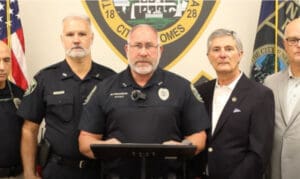Ever wonder how the National Weather Service gets all the severe storm information that is passed on to the public? One way is through communications with volunteer storm spotters. To that end, representatives from the Coweta County Emergency Management and the National Weather Service will present a SKYWARN Storm Spotter class on March 12.
SKYWARN is a volunteer program that has trained nearly 300,000 sever weather spotters, according to the National Oceanic and Atmospheric Administration (NOAA). The March 12 training in Coweta will be held at the fairgrounds located at 275 Pine Road in Newnan. Registration begins at 6:30 p.m. followed by the class instruction at 7 p.m.
The class will be taught by a National Weather Service meteorologist and is open to volunteers with an interest in public service, a responsibility for protecting others or access to communications systems like HAM radio.
To register, contact Coweta County Emergency Management Director Jay Jones at [email protected] or 770-254-2650.
The effects of severe weather are felt every year by many Americans. To obtain critical weather information, NOAA’s National Weather Service (NWS) established SKYWARN with partner organizations, according to NOAA. SKYWARN is a volunteer program with more than a quarter million trained severe weather spotters. These volunteers help keep their local communities safe by providing timely and accurate reports of severe weather to the National Weather Service, NOAA said.
The main responsibility of a SKYWARN spotter is to identify and describe severe local storms. In the average year, 10,000 severe thunderstorms, 5,000 floods and more than 1,000 tornadoes occur across the United States. These events threatened lives and property.
Since the program started in the 1970s, the information provided by SKYWARN spotters, coupled with Doppler radar technology, improved satellite and other data has enabled NWS to issue more timely and accurate warnings for tornadoes, severe thunderstorms and flash floods, according to NOAA.
“Trained storm spotters are part of the ranks of citizens who form the nation’s first line of defense against severe weather,” NOAA said. ”There can be no finer reward than to know that their efforts have given communities the precious gift of time: seconds and minutes that can help save lives.”











Leave a Comment
You must be logged in to post a comment.